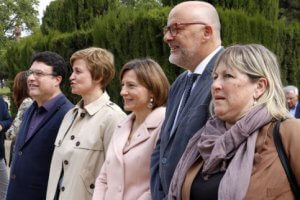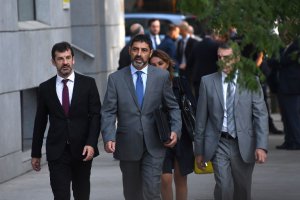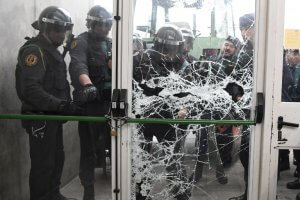The main Catalan Trial that was held at Spain’s Supreme Court in Madrid lasted from 12 February until 12 June – 52 days of court sessions and 422 witness statements over 4 months – with the verdicts not expected until the autumn.
However, there are now several other judicial proceedings underway, all related to Catalonia’s push for independence in 2017, and all being handled by different courts with other people accused. Here’s a summary to the other cases, including a recap on the Supreme Court trial.
The main Catalan Trial that was held at Spain’s Supreme Court
Defendants: In all, 12 people were in the dock during the trial hearings, including some of Catalonia’s most senior politicians at the time of the 2017 independence bid. Nine of them were ministers in the government of Carles Puigdemont, who would also be on trial had he not chosen to go into exile in Belgium. The accused also include Carme Forcadell, who served as the parliament speaker, as well as Jordi Sànchez and Jordi Cuixart, the activists leading Catalonia’s main pro-independence grassroots groups at the time of the referendum.
Nine of the accused have been held in preventive detention for most of the process, with Sànchez and Cuixart being uninterruptedly detained since 16 October 2017, despite calls for their release from human rights groups and the United Nations Working Group on Arbitrary Detentions (WGAD).

Charges: Spain’s public prosecutor has charged the nine defendants in custody with misuse of public funds, sedition, and violent rebellion – the latter being one of the most serious offences in the criminal code. The longest requested prison sentence is for Catalonia’s former vice president and leader of the Esquerra Republicana (ERC) party, Oriol Junqueras, for whom the public prosecutor has requested 25 years in jail.
The three defendants who were not held behind bars during the trial face lesser charges for offences such as disobedience and misuse of public funds. Rather than prison terms, prosecutors have asked for them to be temporarily barred from holding public office.
Stage: After 52 sessions spanning four months, the cross-examination of the 12 prosecuted leaders, and testimony from 422 witnesses, the trial ended on 12 June. It’s now up to the judges to issue a final ruling, which is expected to come out in the autumn.
A ‘spin-off trial’ featuring former parliament bureau members
Spain’s High Court in Catalonia (TSJC)
Defendants: Pro-independence leaders tried in Spain’s Supreme Court repeatedly requested their case be moved to the High Court in Catalonia (TSJC), claiming that it is the most qualified to handle their case. The Supreme Court admitted the request, but only for six of them: five former members of the parliament bureau and former MP from the far-left CUP party, Mireia Boya.

As the former chamber speaker and head of the parliament bureau, Carme Forcadell criticised the Supreme Court for not transferring her case along with her colleagues.
Charges: All six defendants are charged with the offence of disobedience for allowing laws enabling independence to be voted on and approved by Catalan lawmakers. Boya, along with Anna Gabriel who avoided prosecution by moving to Switzerland, is being charged for registering the initial proposal.
Stage: The public prosecutor, state attorney and ‘popular prosecutor’ – the far-right Vox party – were given 10 days at the end of April to present their allegations, and once the defence has laid out its position, the preparations for the trial’s start will begin.

The Catalan police leadership on trial
Spain’s National Court
Defendants: Catalan police chief at the time of the independence bid, Josep Lluís Trapero, is among four former police heads being prosecuted in Spain’s National Court. The Mossos d’Esquadra police are accused of aiding the independence bid with a lack of action in preventing the referendum and handling the protests during Spanish police raids on 20 September 2017.
Charges: Trapero, another Mossos head, and a former interior ministry official are charged by the public prosecutor with rebellion, and face up to 11 years in prison. Another police head is accused of the lesser crime of sedition, and risks a four-year jail term if found guilty.
Stage: The court recently announced that the trial will begin on 20 January 2020, and will probably go on until the middle of March 2020.

30 people on trial over referendum logistics
Local Barcelona court
Defendants: A court in Barcelona is also prosecuting some 30 people indicted over the independence bid, specifically for contributing to the logistics and organisation of the 1 October 2017 referendum. The defendants include government officials and employees, civil servants, media workers, technicians and business people. Among those indicted are the Diplocat diplomacy council’s former head, the former secretary of public information, and the former Catalan government delegate to the EU.
Charges: The defendants all face a variety of charges, such as misuse of public funds, disobedience, deceit, revealing secrets and perversion of justice. Until the trial takes place, those accused have been granted liberty on bail of 5.8m euros.
Stage: The court is still carrying out its investigation in preparation for the trial. On 9 July 2019, Guardia Civil officers were ordered by the court to enter a number of Catalan government buildings to look for evidence, such as files and bills.
